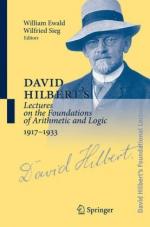|
This section contains 403 words (approx. 2 pages at 300 words per page) |
World of Physics on David Hilbert
David Hilbert was one of a group of nineteenth-century mathematicians like Nikolai Ivanovich Lobachevski (1792-1856), János Bolyai (1802-1860), and Georg Riemann (1826-1866) who for many decades had been reexamining the geometry of Euclid. The hoped-for goal of much of this work was to open up new possibilities for analysis of seemingly insoluble problems in conventional geometry and analytic geometry. But for some, like Hilbert, the redefining of Euclid's postulates promised to create a logical foundation upon which the entire structure of mathematics could be built.
Although it may seem obvious that mathematics is founded on logical principles, when properties of numbers are analyzed in depth, the reasons for their behavior are not immediately apparent. The logical source of seemingly simple and self-evident principles of arithmetic, such as the addition of numbers, is difficult to demonstrate when the only proof for its existence is based solely upon human intuition--what "feels right" or seems that it must be so. Intuition was the source that Euclid invoked in his axiomatic presentation of geometry in the Elements. But mathematicians like Hilbert wanted a more secure foundation for mathematics to rest upon than human intuition. The goal of discovering a consistent, logical basis of mathematics that did not rely on intuition was, in fact, a philosophical quest as much as a scientific pursuit, for many felt that if the universe had any objective reality at all, it should be definable in terms that do not require a human interpretation to give it form. It was this quest for the logical foundation of mathematics, indeed of all reality, to which Hilbert devoted much of his professional life.
Hilbert was born in East Prussia and later attended Königsberg University, an ancient and prestigious center of learning. After receiving his Ph.D. in 1885, Hilbert traveled to Leipzig, Germany, and Paris, France, before eventually settling into a lifelong professorial position at Göttingen University. He died at Göttingen in 1943. During his long life, Hilbert expended much effort to develop a logical basis for mathematics, as did such mathematicians as Alfred North Whitehead and Bertrand Russell. For these philosophers of mathematics, the disaster for this approach came in 1931, with Kurt Gödel's monumental proof that a collection of axioms could never lead to a complete and self-consistent mathematical system. This ended Hilbert's, and all others', attempts to discover an axiomatic "foundation" of mathematics.
|
This section contains 403 words (approx. 2 pages at 300 words per page) |


